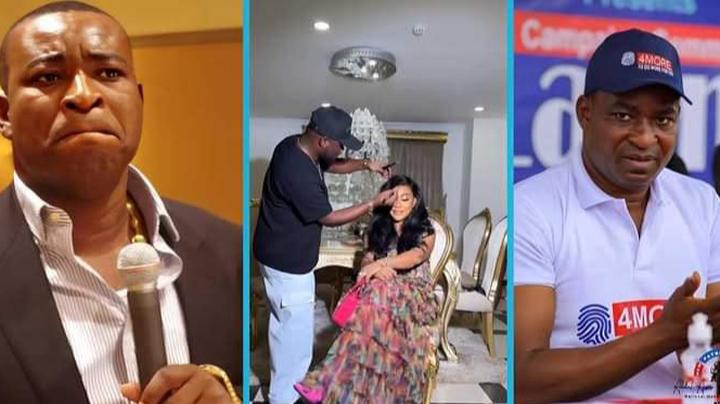Accra, Ghana — The wife of the outspoken New Patriotic Party (NPP) stalwart and Ashanti Regional Chairman, Kwaku Kwarteng Wontumi, has once again set tongues wagging with her jaw-dropping fashion statement. Known for her elegance and impeccable style, Madam Wontumi turned heads after a recent visit to a high-end salon where she indulged in a makeover featuring designer accessories reportedly worth over GH¢100,000.
The mother-of-two, often admired for her poised and sophisticated public appearances, walked into the salon clad in luxurious attire and emerged looking every bit the fashion icon that social media users have come to expect from her. From exquisite handbags to sparkling jewelry and bespoke footwear, her ensemble screamed opulence.
Photos and videos from the makeover session quickly made rounds on social media platforms, triggering a mix of awe and criticism. Admirers praised her flair and confidence, applauding the elegance she brings to the public eye. However, some online commentators were less generous, with one social media user boldly accusing the source of her wealth.
“Galamsey money paid for her lifestyle,” the comment read, sparking a wave of debate across Twitter and Facebook.
The reference to “galamsey,” the illegal small-scale gold mining notorious for its environmental destruction and illegality, reflects a deeper undercurrent of suspicion among some members of the public concerning how some political figures and their families acquire wealth.
Madam Wontumi, who has largely remained away from the spotlight outside political circles, is now at the center of a social media firestorm. But those close to her insist her style and spending are products of hard work and sound financial management within the family.
Fashion experts note that her choice to invest in high-end accessories is a statement of power and success, commonly seen among Ghana’s elite women. “It’s about branding, self-expression, and showing that Ghanaian women can own luxury with grace,” said Ama Serwaa, a leading fashion consultant in Accra.
Meanwhile, the controversy raises larger questions about wealth, public perception, and the role of politicians’ families in Ghana’s society. While some argue that public figures should maintain modesty, others believe personal style is a private matter that should not detract from their professional or political contributions.
As the debate rages on, one thing is clear: Madam Wontumi’s recent makeover has put her style—and her name—firmly back in the headlines. Whether admired or criticized, her fashion choices have sparked a wider conversation about wealth, image, and politics in contemporary Ghana.
In the words of many online users: Ahoufedua papabi! — a fitting praise for a woman who clearly knows how to make a statement.
Source
